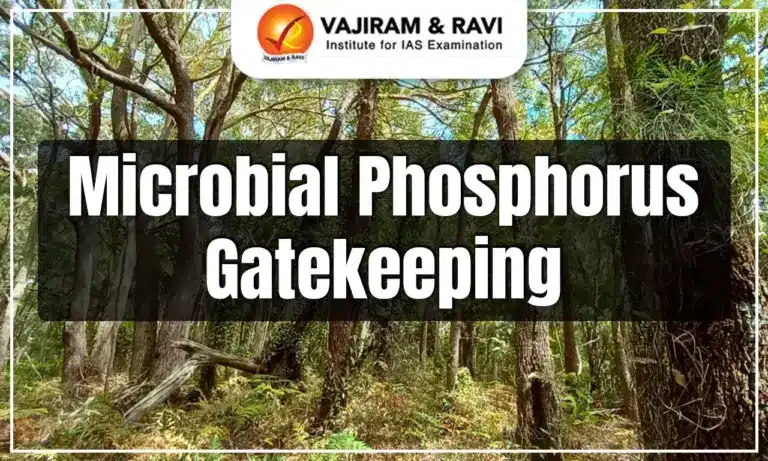Microbial Phosphorus Gatekeeping Latest News
A recent study published in Nature Geoscience examined the role of soil microbes in phosphorus cycling over 700,000 years in the Cooloola coastal dune system, located in Cooloola National Park, Queensland, Australia.
Importance of Phosphorus in Ecosystems
- Phosphorus (P) is an essential macronutrient required by all life forms. It is crucial for:
- Energy metabolism (e.g., ATP production),
- Cell membrane synthesis (phospholipids),
- Photosynthesis and genetic functions (DNA/RNA).
- In ancient and weathered soils, such as those in Australia, phosphorus levels decline significantly over time due to mineral weathering, making it the primary limiting nutrient in many ecosystems.
Key Findings
- The study discovered that soil microbes—especially fungi and bacteria—act as ‘phosphorus gatekeepers’ by regulating how phosphorus is accessed and cycled in the soil.
- Microbes use several adaptive mechanisms to survive phosphorus scarcity:
- Replacing membrane phospholipids with non-phosphorus lipids,
- Accumulating microbial lipids (fats) that reduce the need for phosphorus,
- Optimising phosphorus use efficiency in their metabolism.
- This microbial gatekeeping strongly influences how phosphorus becomes available to plants, creating a balance of competition and facilitation:
- Microbes and plants compete for phosphorus,
- But microbes aid plants by recycling phosphorus and making it more accessible in the long run.
Microbial Phosphorus Gatekeeping FAQs
Q1: What is meant by microbial phosphorus gatekeeping?
Ans: It refers to the ability of soil microbes to regulate the availability of phosphorus to plants by controlling its release, uptake, and storage in soil ecosystems.
Q2: Why is phosphorus important in agriculture?
Ans: Phosphorus is a vital macronutrient essential for plant growth, root development, and energy transfer (ATP).
Q3: How do microbes influence phosphorus cycling?
Ans: Microbes solubilise inorganic phosphorus, produce phosphatase enzymes, and store or release phosphorus based on environmental conditions.
Source: PHY
Last updated on February, 2026
→ UPSC Notification 2026 is now out on the official website at upsconline.nic.in.
→ UPSC IFoS Notification 2026 is now out on the official website at upsconline.nic.in.
→ UPSC Calendar 2026 has been released.
→ UPSC Final Result 2025 is expected to be released in the first week of March 2026.
→ Check out the latest UPSC Syllabus 2026 here.
→ Join Vajiram & Ravi’s Interview Guidance Programme for expert help to crack your final UPSC stage.
→ UPSC Mains Result 2025 is now out.
→ UPSC Prelims 2026 will be conducted on 24th May, 2026 & UPSC Mains 2026 will be conducted on 21st August 2026.
→ The UPSC Selection Process is of 3 stages-Prelims, Mains and Interview.
→ Prepare effectively with Vajiram & Ravi’s UPSC Prelims Test Series 2026 featuring full-length mock tests, detailed solutions, and performance analysis.
→ Enroll in Vajiram & Ravi’s UPSC Mains Test Series 2026 for structured answer writing practice, expert evaluation, and exam-oriented feedback.
→ Join Vajiram & Ravi’s Best UPSC Mentorship Program for personalized guidance, strategy planning, and one-to-one support from experienced mentors.
→ Check UPSC Marksheet 2024 Here.
→ UPSC Toppers List 2024 is released now. Shakti Dubey is UPSC AIR 1 2024 Topper.
→ Also check Best UPSC Coaching in India
Tags: Microbial Phosphorus Gatekeeping prelims pointers upsc prelims current affairs


















